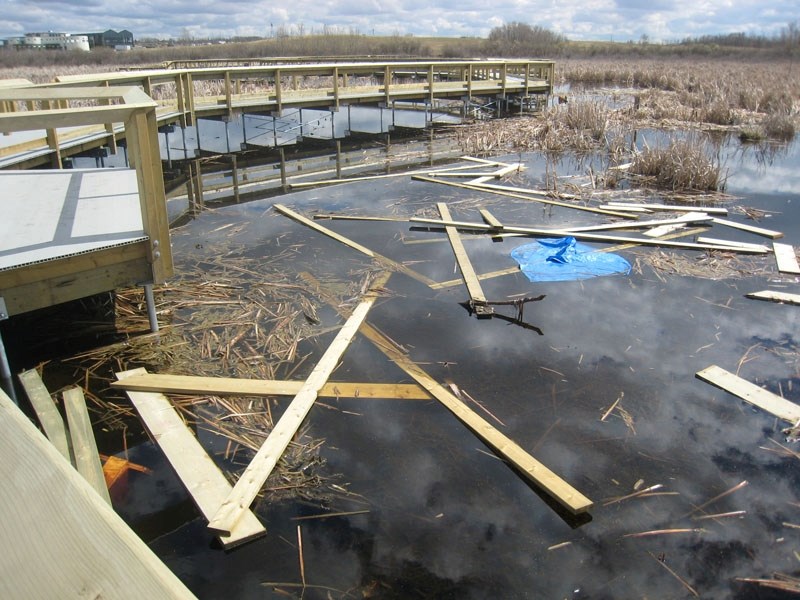Vandals trash wetland
Local birds got some unwelcome junk dumped in their home last Saturday after vandals ransacked the John E. Poole wetland.
Ducks Unlimited officials report that vandals broke into the construction site for the John E. Poole interpretive boardwalk near the Big Lake Environment Support Society's viewing platform on the night of May 7 and threw tools, junk and construction materials into the wetland.
Dale Soetaert, head of habitat asset management for Ducks Unlimited in Alberta, says he saw the damage when he visited the site the next day. There were about 50 large planks floating in the water, in addition to some trim, brooms, an extension cord and a compound mitre saw. Construction crews had left the material at the site.
"Whatever they could find, they fired [in there]," Soetaert said.
The boardwalk itself was not damaged, Soetaert added, although the vandals did bend part of the fence surrounding it. "It's more of a nuisance than anything." None of the birds nesting in the wetland were harmed, although they were irritated when he waded in to retrieve the debris.
Naturalist Ludo Bogaert says he noticed the vandalism during his Sunday walk. "It was a mess," he says, with all the lumber thrown into the water. "Brain-dead people do that."
Soetaert says they have no suspects for the act and aren't looking for tips from the public. "Whomever it was, [they were] just out to make a mess."
Crews expect to stop construction next week to avoid interfering with nesting birds, Soetaert says, and to resume work later this summer. The boardwalk should be open to the public this fall.
Renewables could power world
The world could get about 77 per cent of its power from renewable sources by 2050, says a new United Nations report, but not without a lot of work.
The UN's Intergovernmental Panel on Climate Change's third working group (IPCC) released a report on renewable energy and greenhouse gas emissions on May 9. The report is a summary of a larger 1,000-page document set for release later this month.
The IPCC is an international group of researchers that studies climate change. This is the group's first comprehensive look at renewable power.
The report, written by about 120 researchers, finds that renewable energy sources such as wind, solar and geothermal power could meet anywhere from 27 to 77 per cent of the world's heat and electricity needs by 2050 and help keep the world below two degrees of warming.
Examining some 160 scenarios, the group found that solar power could provide about 10 per cent of the world's energy by 2050, with wind accounting for 20. Renewables provided more energy than nuclear or fossil fuels with carbon-capture in most of the scenarios.
Wind and solar energy each saw 30 and 50 per cent growth rates, respectively, in 2008-09 despite the recession, they found, and had grown much cheaper over the last few decades. There were also "few, if any fundamental technological limits" to further growth.
But there are considerable political and technical challenges to overcome, the report found. While some technologies are now cost-competitive, many others are still more expensive than fossil fuels. The world would also have to invest about US$5 trillion by 2020 to bring in the necessary renewables — about one per cent of the world's wealth.
Carbon pricing would certainly help, says Leigh Bond of Threshold Energies Corp., citing one of the report's suggested measures. "There's got to be a monetized value put on carbon," he said, as that would make many renewable technologies cost-competitive. "If they could figure that one out, everything else would probably take care of itself."
The summary is available at http://srren.ipcc-wg3.de/report.




